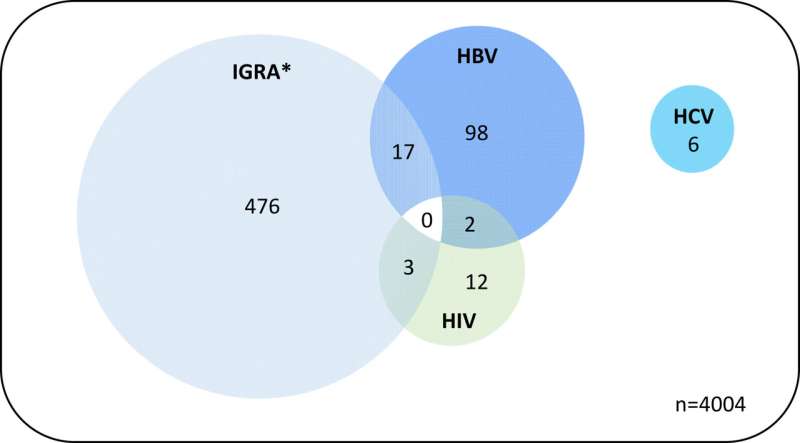
Routine testing for multiple infectious diseases among migrants will benefit health care systems by identifying key infections earlier, a new study finds.
The observational study, which looked at data from a novel GP-led screening program in Leicester, showed that having an integrated approach to migrant health care improved health outcomes for everyone.
Results of the study have been published in eClinicalMedicine.
Migrants are at increased risk of infectious diseases because of a number of factors before, during and after migration, including exposure to infections, poor living conditions and inadequate health care access.
Typically, they are seen by GPs and are not routinely tested for infectious diseases including tuberculosis (active or latent), HIV, and hepatitis B and C. While some Emergency Departments have introduced tests for blood-borne viruses for all patients, unless they choose to opt out, this still means infected people may be missed unless they require emergency treatment.
However, the Leicester screening program, which included 4,004 migrant patients in Leicester from 2016–19, routinely tested for all of these.
Now, analysis of the data collected during this time shows that a substantial proportion of these infections were new diagnoses—some 17 cases of active TB, 397 latent TB, 71 hepatitis B, five hepatitis C and six HIV.
Professor Manish Pareek, clinical professor in infectious diseases and Director of the Development Center for Population Health in the University of Leicester’s Department of Respiratory Sciences, who led the study, said, “A substantial proportion of all the infectious diagnoses were new, meaning the patients had no idea they were infected.
“The screening program in Leicester picked this up, allowing patients to receive specialist care going forward. This clearly demonstrates that a combined and integrated approach for multiple key infections would help to diagnose patients earlier, improve health outcomes for them and reduce the risk of onward spread.
“While some testing for infectious disease may take place at the discretion of individual GPs currently, this is neither the norm and typically happens in silo. Our findings therefore highlight the public health benefits of a multiple infectious disease program for newly entered migrants.”
Dr. Rebecca Baggaley, Senior Research Fellow at the Institute of Health Informatics at University College London and joint first author of the study, said, “Importantly, this study has demonstrated that this testing approach is acceptable to migrants when they register with a GP, and the vast majority who test positive are being successfully treated.
“Now we have demonstrated the acceptability and effectiveness of this testing program for migrants, the next step is to evaluate its cost effectiveness as a health care package and the feasibility of rolling out such testing, when GP clinics’ time and resources are already overstretched.”
Dr. Nil Sanganee, Chief Medical Officer for NHS Leicester, Leicestershire & Rutland Integrated Care Board (ICB), responsible for planning and commissioning local NHS services, added, “These findings show that universal testing of recent migrants for key infections in a primary care setting is a major tool for identifying new infections and successfully linking patients to care, improving health outcomes for these individuals and the wider community.
“This approach would complement other successful screening policies such as the UK Emergency Department blood borne virus testing program, with the common goal of reaching current infectious disease control targets.”
More information:
Rebecca F. Baggaley et al, Community-based testing of migrants for infectious diseases (COMBAT-ID): observational cohort study measuring the effectiveness of routine testing for infectious diseases among migrants attending primary care, eClinicalMedicine (2025). DOI: 10.1016/j.eclinm.2025.103253
University of Leicester
Citation:
Multiple testing for infectious diseases key to cutting onward transmission, study indicates (2025, June 3)
retrieved 3 June 2025
from https://medicalxpress.com/news/2025-06-multiple-infectious-diseases-key-onward.html
This document is subject to copyright. Apart from any fair dealing for the purpose of private study or research, no
part may be reproduced without the written permission. The content is provided for information purposes only.

